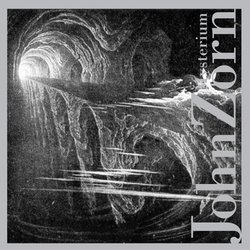| All Artists: John Zorn, Bradley Lubman, Stephen Gosling, Abby Fischer, Kirsten Solleck-Avella, Lisa Bielawa, Martha Cluver, Martha Sullivan Title: Mysterium Members Wishing: 2 Total Copies: 0 Label: Tzadik Original Release Date: 1/1/2005 Re-Release Date: 10/18/2005 Genres: International Music, Jazz, Special Interest, Pop, Classical Styles: Avant Garde & Free Jazz, Jazz Fusion, Modern Postbebop, Vocal Jazz, Bebop, Vocal Pop, Chamber Music, Historical Periods, Classical (c.1770-1830), Instruments, Electronic Number of Discs: 1 SwapaCD Credits: 1 UPC: 702397801825 |
Search - John Zorn, Bradley Lubman, Stephen Gosling :: Mysterium
 | John Zorn, Bradley Lubman, Stephen Gosling Mysterium Genres: International Music, Jazz, Special Interest, Pop, Classical
|
Larger Image |
CD Details |
CD ReviewsExploratory compositions. Michael Stack | North Chelmsford, MA USA | 12/06/2005 (4 out of 5 stars) ""Mysterium" is a collection of three compositions by John Zorn, performed with very different instrumentations but all exploring feminine elements and themes. "Orphee", examining the Orpheus and Euridyce myth, is scored for sextet extending the Debussy "Sonata" model of flute, viola and harp with harpsichord, celeste and live electronics. The resulting piece is evocative-- trading pyrotechnics for haunting tension and moving the theme between the flute (aggressively and ably played by Tara O'Connor, whose performance is the highlight here) and viola. "Frammenti del Sappho", inspired by the works of Sappho, is performed by female choir (five voices) composed using older forms (the white keys on the piano) to lend an old world sound to it. For those with the notion that Zorn is all about frantic energy, this one should dispel that. More than anything else, this has a bizarre sense of calm and patience to it, and while the voices do reach agressively at times, it is a slowly developing and relaxed piece that bears more fruit upon repeated listens. "Walpurgisnacht", a string trio in three movements, closes the piece. Inspired by Webern's "Streichtrio" (although that piece was two movements) and notions as the Witches' Sabbath, it is in very much the opposite of "Frammenti del Sappho". Fierce and yet delicate, it finds Zorn taking full advantage of the talents of his performers (Jennifer Choi on violin, Richard O'Neill on violad Fred Sherry on cello). The piece can be a bit overwhelming, like most of Zorn's string trio/quartet work, but it is exciting and powerful and well worth repeated listens. All in all, this is a nice recording, the three pieces are evocative and exciting. It's not quite as powerful as, say, "Magick", but its well worth the investment. Recommended." Short, but brilliant Troy Collins | Lancaster, PA United States | 11/28/2005 (5 out of 5 stars) "Composer John Zorn has been writing "classical" scores since his earliest days, although those fans who know him only from his post-modern jump cutting projects like Naked City and his early game pieces like Cobra may not be entirely familiar with his more "traditional" oriented work. Zorn's influences span time and genre and he is no stranger to the classics. These three new compositions find Zorn bouncing between time periods and stylistic genres only to come full circle to embrace his own singular sound. Although each of the pieces here qualify as a miniature, none is less than nine minutes long. The first is a variation on a famous Debussy chamber piece, updated with subtle electronics and added instrumentation. Delicate flute passages are interspersed with chiming harpsichord, understated strings and washes of crackling electronics. At once ethereal and sublime, the next minute grating and harsh, it is classic Zorn, but arranged for the Concert Hall. The second is an all-female vocal motet, borrowing from Greek scales and ancient music. It is truly one of the most subdued and beautiful pieces the maestro has ever lent his pen to. More akin to the vocal work of Meredith Monk, it is a truly unique piece in Zorn's catalog. The final composition is more typical of Zorn's recent forays into the genre, a string trio with conceptual foundations in witchcraft, it is a modern semi-atonal exploration of sound dynamics. Listening to the album as a whole, one is struck with Zorn's innate dependence on his rootlessness in regards to stylistic clarity and limitations. Although the pieces never sound at odds with each other, they do encompass the sort of democratic worldview that could only be the by-product of a 20th century mind. Perhaps our finest contemporary example of the potential for the continued relevance of concert music in a new century, Zorn has a profoundly important job ahead of him. "Mysterium" is one more weapon in his arsenal." Avant garde chamber music SPM | Eugene, Oregon | 09/24/2006 (4 out of 5 stars) "Zorn is at his best when he bends the rules for chamber music. Although some of his explorations in this genre can be heard by the more infamous composers of the 20th century, Zorn stands apart by coming up with non-musical ideas and then expressing them through music. The latest example of this talent is Frammenti del Sappho, in which he uses female voices to explore some ideas about feminine spirituality. It's a beautiful, unforgettable piece of music. The remainder of the disc as almost as good."
|

 Track Listings (5) - Disc #1
Track Listings (5) - Disc #1